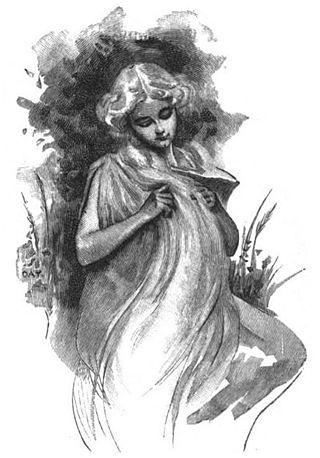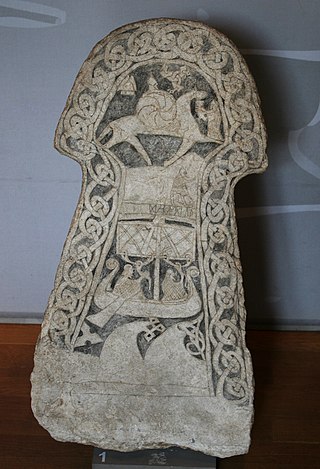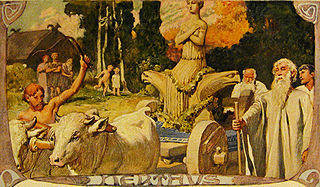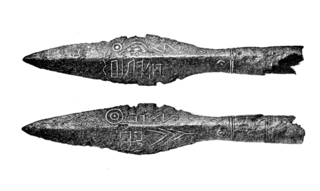Odinism is a term for Heathenry, a modern pagan religion, typically used by those who hold to "folkish" or race-centric ideologies.
Odinism may also refer to:
Odinism is a term for Heathenry, a modern pagan religion, typically used by those who hold to "folkish" or race-centric ideologies.
Odinism may also refer to:

In Norse mythology, Sif is a golden-haired goddess associated with earth. Sif is attested in the Poetic Edda, compiled in the 13th century from earlier traditional sources, and the Prose Edda, written in the 13th century by Snorri Sturluson, and in the poetry of skalds. In both the Poetic Edda and the Prose Edda, she is known for her golden hair and is married to the thunder god Thor.

In Norse mythology, a valkyrie is one of a host of female figures who guide souls of the dead to the god Odin's hall Valhalla. There, the deceased warriors become einherjar. When the einherjar are not preparing for the cataclysmic events of Ragnarök, the valkyries bear them mead. Valkyries also appear as lovers of heroes and other mortals, where they are sometimes described as the daughters of royalty, sometimes accompanied by ravens and sometimes connected to swans or horses.
Bor may refer to:
Billing may refer to:

Germanic mythology consists of the body of myths native to the Germanic peoples, including Norse mythology, Anglo-Saxon mythology, and Continental Germanic mythology. It was a key element of Germanic paganism.
Odin is the chief god of the Norse pantheon.
Wotansvolk promulgates a white nationalist variant of Neo-Paganism—founded in the early 1990s by Ron McVan, Katja Lane and David Lane (1938–2007) while Lane was serving a 190-year prison sentence for his actions in connection with the white supremacist revolutionary domestic terrorist organization The Order. After the founding of 14 Word Press by David Lane and his wife Katja to disseminate her husband's writings, Ron McVan joined the press in 1995 and founded Temple of Wotan. 14 Word Press - Wotansvolk proceeded to publish several books for the practice of Wotanism before becoming defunct in the early 2000s.
Irmin may refer to:
Woden, or Odin, is the chief god of Germanic mythology.

As polytheistic systems evolve, there is a tendency for one deity to achieve preeminence as king of the gods. This tendency can parallel the growth of hierarchical systems of political power in which a monarch eventually comes to assume ultimate authority for human affairs. Other gods come to serve in a Divine Council or pantheon; such subsidiary courtier-deities are usually linked by family ties from the union of a single husband or wife, or else from an androgynous divinity who is responsible for the creation.
Oswald may refer to:

In Norse mythology, Vili and Vé are the brothers of the god Odin, sons of Bestla, daughter of Bölþorn; and Borr, son of Búri.

The Odinist Community of Spain – Ásatrú, also known as European Odinist Circle, is a neo-völkisch organisation in Spain, founded in 1981, for followers of the form of modern Heathenry known as Odinism. The community bases its ideology on the Visigothic, Suevian and Vandalian Germanic heritage of modern Spain, Portugal and Occitania. It was legally recognised as a religious institution by the Spanish government in 2007, and performed the first legal pagan wedding in mainland Spain since the Visigothic era, in Barcelona on 23 December 2007. In Albacete in 2009, COE completed the first temple to Odin believed to have been built in over 1,000 years. A less Odin-focused group split off in 2012 as the Ásatrú Lore Vanatrú Assembly (ALVA).

Odin is a widely revered god in Germanic paganism. Norse mythology, the source of most surviving information about him, associates him with wisdom, healing, death, royalty, the gallows, knowledge, war, battle, victory, sorcery, poetry, frenzy, and the runic alphabet, and depicts him as the husband of the goddess Frigg. In wider Germanic mythology and paganism, the god was also known in Old English as Wōden, in Old Saxon as Uuôden, in Old Dutch as Wuodan, in Old Frisian as Wêda, and in Old High German as Wuotan, all ultimately stemming from the Proto-Germanic theonym *Wōðanaz, meaning 'lord of frenzy', or 'leader of the possessed'.
"Wife of God" can refer to:
Sigi is a mythical hero and a son of Odin in Norse legends.

Norse, Nordic, or Scandinavian mythology, is the body of myths belonging to the North Germanic peoples, stemming from Old Norse religion and continuing after the Christianization of Scandinavia, and into the Nordic folklore of the modern period. The northernmost extension of Germanic mythology and stemming from Proto-Germanic folklore, Norse mythology consists of tales of various deities, beings, and heroes derived from numerous sources from both before and after the pagan period, including medieval manuscripts, archaeological representations, and folk tradition. The source texts mention numerous gods such as the thunder-god Thor, the raven-flanked god Odin, the goddess Freyja, and numerous other deities.

Gothic paganism or Gothic polytheism was the original religion of the Goths before their conversion to Christianity.
Wotanism may refer to:
Wotan is a character in Richard Wagner's opera cycle Der Ring des Nibelungen, inspired by the Germanic god Odin.